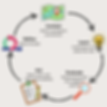- Iain Baxter
- Jun 2, 2025
- 4 min read
How to navigate uncertainty with the CLEAR Framework

In a quarter century of working in tech (jeez I feel old!), I don't remember a time of more uncertainty.
The big questions doing circuits in my mind
Is knowledge work going to be replaced by AI? What are all the extra developers and user experience designers going to do when AI can do most of their job? How will established SaaS operators compete against determined solopreneurs with a bit of tech background, vibe-coding clones of their systems? Will in-house teams build completely bespoke systems that solve their unique problems? How many years of work is there to help clients make the transition? Do I need a major career change?
Will we all become experts in prompt engineering and work a 3-day week? Does a 3-day work week pay the bills with high inflation and wage stagnation? Will we get universal basic income? What will pay for that? Will more printed money cause more inflation?
AI disruption is the obvious uncertainty, but there's more. The economy feels like it's held together with sellotape and chewing gum. We've enjoyed peace in our home countries for 80 years while dabbling in far-away wars, but what if conflict came closer to home? And what about energy? All those GPUs use lots of power and get hot. And the trend toward electrification of vehicles is putting strain on the grid and transport infrastructure.
All of this uncertainty causes more than a bit of anxiety. I've been feeling it myself recently, pondering whether or not to jump fully on the AI train, but it's overwhelming. GPT o3 or 4o - what’s the difference? Do I need Claude in my life? A Grok? There's uncertainty at every level - individual, start-up, small business, SME, corporate.
It’s not all doom and gloom...
With great uncertainty comes great opportunity. It's never been cheaper to build a digital product, and it’s easier than ever to access the wealth of knowledge at our fingertips. It could be the perfect time to ditch corporate life and pursue that lifelong passion.
But the overarching question is how do we escape overwhelming paralysis and find our way through uncertainty?
What’s wrong with existing frameworks?
The most well known uncertainty frameworks come from the military.
OODA: Observe, Orient, Decide, Act. This is about reducing panic and putting structure around decision making. It makes sense, but it's almost too simple and obvious. Of course you're going to observe, orient, decide, then act.
VUCA: Volatility, Uncertainty, Complexity, Ambiguity. This one categorises uncertainties into rate of change, amount of unpredictability, interconnectedness, and vagueness.
OODA feels too obvious. VUCA is a nice way to categorise uncertainty, but it's abstract and not action oriented. Neither really helps you get stuck in and do something about the uncertainty you're facing.
A better framework to navigate uncertainty
So I thought about building on these frameworks to make them more action oriented and iterative, and better suited to fast-moving teams. In the last couple of years, I've got deep into workshopping and facilitation. I’ve tried and tested formats like Design Sprints, Lightning Decision Jams, and Strategy Sprints. These are designed to be interactive, efficient and action oriented, and they’ve shown me how a structured and hands-on approach brings clarity and momentum.
The other missing part of the traditional frameworks around uncertainty, is a mechanism for continuous improvement. The pace of change in the modern world is relentless so a framework has to allow for refinement and adjusting as things evolve; adapting as new insights emerge and circumstances shift.
Introducing CLEAR
Here’s what I came up with that will help you make sense of uncertainty and find tangible actions to reduce risk and find opportunities.
Context: What’s the current situation? What’s uncertain? What are the drivers? This is about getting clear about what’s going on outside of your control.
Learn: Collect data to dig deep into the uncertainties. Scenario plan to understand potential outcomes. Ideate on ways to mitigate the risks and exploit the opportunities.
Evaluate: Surface the best ideas and use a decision matrix to categorise quick wins and longer term projects. Not everything that sounds good on a whiteboard is feasible to pursue.
Act: Break down the top ideas into actionable steps with accountable owners. Agree on deadlines and turn this into a plan.
Refine: Revisit the plan regularly and measure progress. Adjust based on new information, and continually improve how the uncertainties are being mitigated or exploited.

Why this actually works
The CLEAR framework has been designed as a fast, action-focused workshop format that helps you, your teams and any organisation go from vague uncertainty to a clear (ahem) and actionable plan in a single day. It’s efficient, it’s practical and it has a bias for action; it’s about getting things done not endless talking and bloated slide decks.
I’m currently road-testing the framework to find gaps and make it better. We’re applying it to real scenarios, developing actual, tangible solutions that can be implemented immediately and adapted as conditions change.
What's next?
I'm running a masterclass where I'll take you through the CLEAR framework in detail. You’ll learn the core principles, working through the exercises step by step so that you can apply it to your unique, uncertain situation. And your feedback will help make the framework even better and stronger.
The world is changing fast. Your approach to uncertainty can change with it.
Ready to stop being overwhelmed by rapid change and start using it to your advantage? Join the Master Uncertainty: A CLEAR framework masterclass and learn how to turn uncertainty into opportunity.